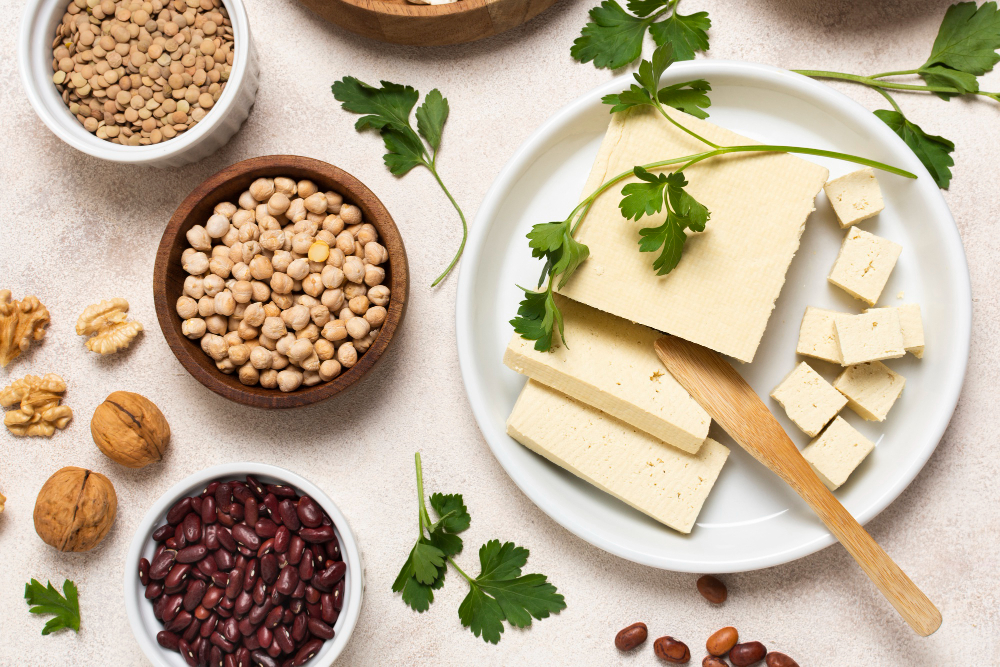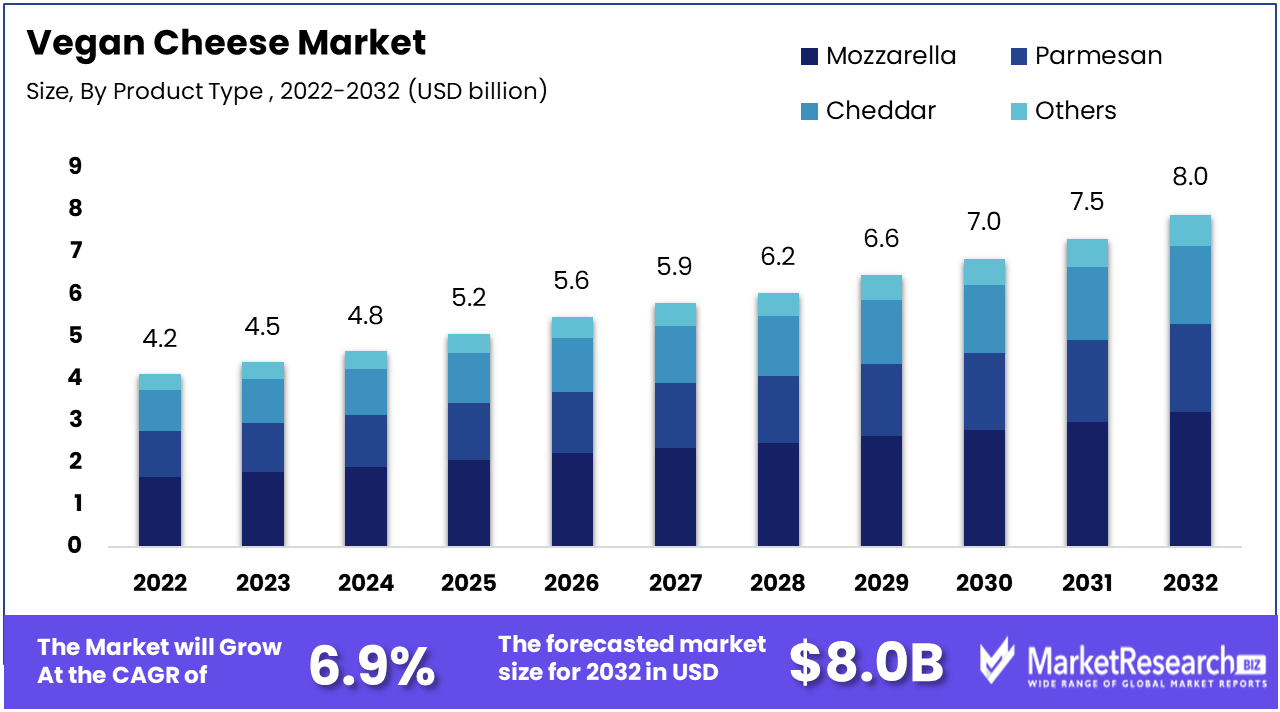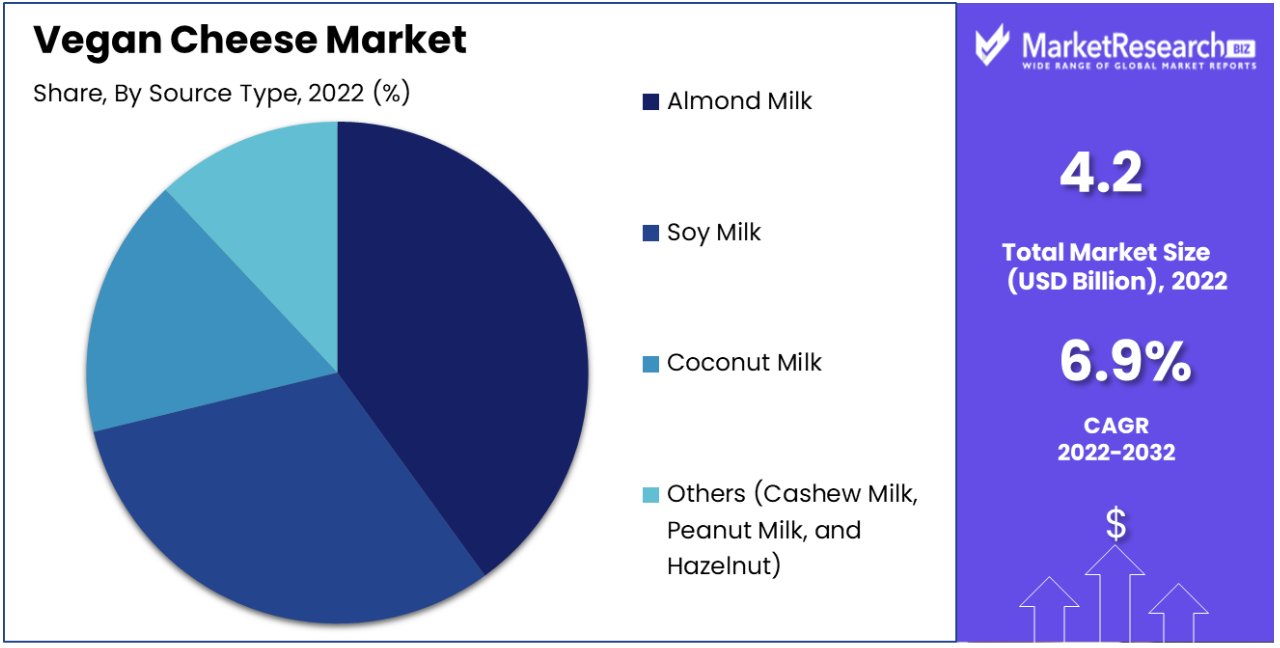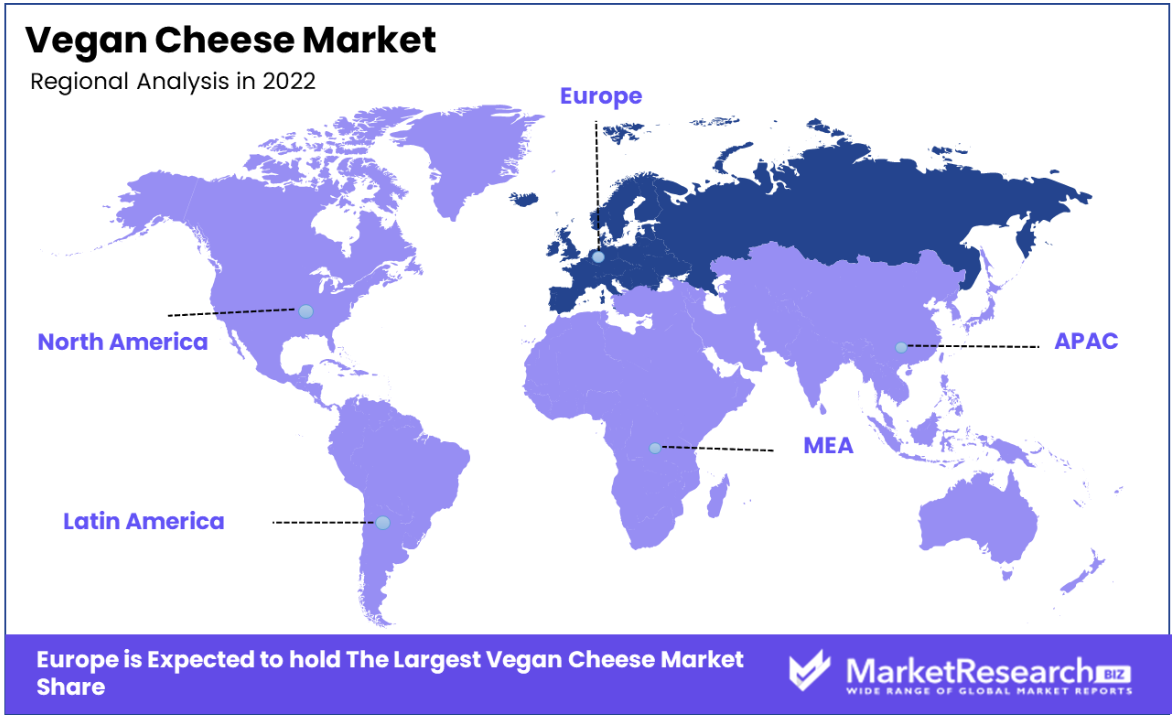
Vegan Cheese Market By Product Type(Mozzarella, Parmesan, Others), By Source Type(Almond Milk, Soy Milk, Others ), By Form(Blocks, Shreds, Others), By Distribution Channel(Hypermarkets/Supermarkets, Convenience Stores, Others), By Application(Dairy and Desserts, Baked Goods, Others), By Region And Companies - Industry Segment Outlook, Market Assessment, Competition Scenario, Trends, And Forecast 2023-2032
-
8335
-
April 2023
-
154
-
-
This report was compiled by Correspondence Linkedin | Detailed Market research Methodology Our methodology involves a mix of primary research, including interviews with leading mental health experts, and secondary research from reputable medical journals and databases. View Detailed Methodology Page
-
Report Overview
Vegan Cheese Market size is expected to be worth around USD 8.0 Bn by 2032 from USD 4.2 Bn in 2022, growing at a CAGR of 6.9% during the forecast period from 2023 to 2032.
Vegan cheese market growth has seen rapid expansion over recent years due to an increasing consumer desire for plant-based alternatives to dairy products. People are increasingly adopting vegan and vegetarian lifestyles due to animal welfare, health, and environmental sustainability concerns. Thus vegan cheese has quickly become an appealing non-dairy product among these individuals.

One key recent advancement in vegan cheese production occurred in October 2023 in Denmark. Scientists there initiated a groundbreaking project aimed at using traditional fermentation techniques to turn peas and beans, naturally abundant with protein, into base components for vegan cheese production. Not only would this address protein deficiencies found in vegan products; but it would also enhance taste and texture. Consumers looking for dairy-free options will likely be pleased with this innovative solution.
In September 2023, another significant development in plant-based products occurred. A study published by the American Chemical Society's Journal of Agricultural and Food Chemistry looked into applying traditional fermentation methods to mimic meat's taste and texture in plant-based products. While not directly relevant to vegan cheese development, this research shows how ongoing efforts within the food industry to increase sensory qualities for vegan alternatives, potentially benefit vegan cheese development as a whole.
As consumer awareness of traditional dairy farming increases, vegan cheese demand is expected to skyrocket. Market players are continuously innovating new vegan cheese products that cater to various taste preferences; using advanced fermentation techniques or other means. Vegan cheese markets look set for continued expansion - offering consumers more tasty yet sustainable dairy-free options.
Driving factors
Rising Consumer Awareness of Health and Environmental Benefits
There is a growing awareness among consumers regarding the health benefits associated with vegan diets. People are becoming more conscious of the impact of their food choices on their well-being, and they are increasingly choosing vegan cheese as a healthier alternative to traditional dairy cheese. Moreover, the environmental benefits of plant-based diets, such as reduced greenhouse gas emissions and lower water usage, are also motivating consumers to opt for vegan cheese.
Increasing Popularity of Veganism and Plant-Based Diets
Veganism and plant-based diets have gained immense popularity in recent years. More individuals are adopting these lifestyles for ethical, environmental, and health reasons. This surge in the number of vegans and flexitarians has created a substantial consumer base for vegan cheese products. As a result, the market is experiencing robust growth, with consumers actively seeking out plant-based alternatives to traditional dairy products.
Growing Availability of Vegan Cheese Products
The accessibility of vegan cheese products has expanded significantly. Both restaurants and grocery stores are increasingly offering a wide range of vegan cheese options to cater to the rising demand. This increased availability not only makes it easier for consumers to incorporate vegan cheese into their diets but also contributes to the normalization of plant-based choices.
Restraining Factors
High Production Costs
Producing the vegan cheese industry often requires expensive ingredients like nuts or soy and expensive equipment, with fermentation and aging time-consuming processes leading to higher labor costs and thus raising retail prices, discouraging budget-minded consumers from purchasing vegan cheese products.
Taste and Texture Challenges
Reaching consumer approval of vegan cheese products can be challenging, particularly as consumers remain loyal to the taste and reliability of dairy cheese products. Vegan products must overcome sensory hurdles to become widely accepted; variations between brands may also discourage conversion.
Limited Availability
Vegan cheese products may not be as readily available in certain regions compared to their dairy counterparts, limiting market growth. Consumers in these areas may be less inclined to incorporate vegan cheese products into their diet due to the difficulties associated with finding these items.
By Product Type
The vegan cheese market has witnessed a significant shift in consumer preferences, and the Mozzarella segment has emerged as a dominant force within this thriving industry. This transformation can be attributed to several factors that have contributed to Mozzarella's prominence as a preferred product type among consumers seeking dairy-free alternatives.
Vegan Mozzarella cheese has successfully replicated the creamy, stretchy texture and mild flavor profile of traditional dairy Mozzarella, making it an appealing choice for those transitioning to plant-based foods. Its versatile nature has made it a staple in various vegan dishes, from pizzas to lasagnas and salads, further driving its popularity.
Furthermore, the growing awareness of the environmental impact of dairy production and the ethical concerns related to animal agriculture has led more individuals to embrace veganism and opt for demand for Mozzarella vegan cheese as a guilt-free alternative.
The vegan cheese market's largest market share is driven by product type, with a focus on vegan food products. Mozzarella vegan cheese is a growth factor, leading the industry with a high growth rate. In the food service industry, cheese substitutes are key, reflecting future trends.
By Source Type
In the ever-evolving landscape of the vegan cheese market, one segment has undeniably taken center stage – Almond Milk. When examining the market by source type, it becomes evident that almond milk-based vegan cheeses have surged in popularity and dominance. This phenomenon can be attributed to several key factors.

Almond milk is a versatile and widely accepted dairy milk alternative. It has a neutral flavor profile that lends itself well to cheese production, making it a top choice for both manufacturers and consumers. Its creamy texture and mild taste make it a suitable base for various cheese varieties, from soft, spreadable options to hard, aged varieties.
Moreover, almond milk is perceived as a healthy option compared to other plant-based milk alternatives. It's often associated with a wealth of health benefits, including being low in saturated fats and rich in essential nutrients. Based on product type health-conscious consumers increasingly seek out plant-based alternatives, and almond milk-based vegan cheeses have met their demand for both taste and nutrition.
Coconut-based vegan cheeses have gained popularity for their rich texture and unique taste, providing a delectable choice for consumers seeking plant-powered options in the Vegan Cheese Market.
By Form
In recent years, the Blocks segment has emerged as a dominant force in the vegan cheese market when categorized By Form. This remarkable shift can be attributed to several major factors driving consumer preferences and industry future trends.
First and foremost, the product from vegan cheese blocks offers versatility and convenience. They can be sliced, shredded, or melted, making them suitable for various culinary applications such as sandwiches, pizzas, and salads. This adaptability has attracted both home cooks and food service professionals, enhancing the market growth prospects.
Furthermore, consumers are increasingly seeking plant-based alternatives that closely mimic the taste and texture of traditional cheese. Vegan cheese blocks have made significant strides in improving their sensory attributes, making them a preferred choice for those looking to adopt a vegan or lactose-free products lifestyle without compromising on flavor and mouthfeel.
By Distribution Channel
The Hypermarkets/Supermarkets segment has dominated the distribution channel category within the thriving Vegan Cheese Market. This trend is reflective of the broader shift towards plant-based cheese diets and lifestyles. Hypermarkets and supermarkets offer a one-stop-shop experience, making them a convenient destination for consumers exploring vegan cheese options.
Several factors contribute to the dominance of hypermarkets and supermarkets in the distribution of vegan cream cheese. Firstly, the extensive shelf space and diverse product offerings allow consumers to choose from a wide range of vegan cheese brands, flavors, and textures. This variety caters to different tastes and dietary preferences, attracting a broad customer base.
Secondly, the convenience factor cannot be overstated. Shoppers can easily add vegan cheese to their grocery lists alongside other vegan or plant-based beverages, making it accessible and hassle-free to incorporate into their diets. Moreover, hypermarkets and supermarkets often run promotions, discounts, and loyalty programs, making vegan cheese more affordable and encouraging its adoption.
The vegan cheese market's annual growth rate is steadily rising. An industry analysis reveals promising potential. Distribution channels (hypermarkets/supermarkets) play a key role. Exploring future trends is essential for market success.
By Application
The Dairy and Desserts segment has indisputably dominated the by-application category within the rapidly growing Vegan Cheese Market. This trend has emerged as a testament to the changing consumer preferences, driven by a surge in health consciousness, environmental concerns, and the increasing adoption of vegan or plant-based diets.
In recent years, the demand for vegan cheese in dairy and dessert applications has skyrocketed. Vegan cheese has successfully infiltrated traditional dairy-based recipes, offering a cruelty-free and sustainable alternative that doesn't compromise on taste or texture. It has seamlessly integrated into a wide array of dishes, from pizzas and pasta to cheesecakes and ice creams, satisfying the cravings of vegans and lactose-intolerant individuals while appealing to flexitarians as well.
This shift is not only a response to dietary restrictions but also a reflection of ethical and environmental considerations. As consumers become more aware of the impact of animal agriculture on the planet and animal welfare, they are actively seeking options that align with their values.
A comprehensive in-depth analysis places vegan cheese in a leading position within the food processing industry. Its diverse range of dairy alternatives caters to the evolving vegan cheese market.
Key Market Segments
By Product Type
- Mozzarella
- Parmesan
- Cheddar
- Others (Cream Cheese and Ricotta)
By Source Type
- Almond Milk
- Soy Milk
- Coconut Milk
- Others (Cashew Milk, Peanut Milk, and Hazelnut)
By Form
- Blocks
- Shreds
- Wedges
- Slices
By Distribution Channel
- Hypermarkets/Supermarkets
- Convenience Stores
- Specialty Retail Stores
- Online Retailers
By Application
- Dairy and Desserts
- Baked Goods
- Snacks and Ready Meals
- Processed and Packed Foods
- Others (Food Service (Hotels, restaurants, Cafe, etc.) and Household)
Growth Opportunity
Increasing Popularity Of Veganism And Flexitarianism
The growing awareness of environmental and health concerns has led to a substantial increase in the popularity of veganism and flexitarianism. As more consumers seek plant-based alternatives to dairy products, the Vegan Cheese Market can capitalize on this trend by offering a wide range of innovative and delicious vegan cheese options. To maximize growth in this area, companies should invest in marketing campaigns that promote the benefits of vegan cheese, such as sustainability, animal welfare, and health advantages.
Improved Taste And Texture Of Vegan Cheese
One of the main challenges for vegan cheese has been replicating the taste and texture of traditional dairy cheese. However, recent advancements in food technology have resulted in significant improvements in this regard. The Vegan Cheese industry can further enhance its market growth potential by investing in research and development to continually improve the taste and texture of vegan cheeses. Creating products that are indistinguishable from dairy cheese in terms of flavor and mouthfeel will attract a wider consumer base.
Innovation In Product Development
Innovation is a key driver of market growth in any market. Vegan cheese companies should focus on continuous product innovation to cater to diverse consumer preferences. This includes developing new flavors, variations, and packaging formats. Furthermore, embracing novel ingredients and production methods can set a brand apart and generate significant interest among consumers.
Latest Trends
Increasing Awareness of the Health Benefits of Vegan Diets
As more people become conscious of their health and well-being, there has been a growing interest in adopting vegan diets. Vegan cheese, made from plant-based ingredients, is seen as a healthier alternative to traditional dairy cheese. It is often lower in saturated fats, cholesterol-free, and can be fortified with essential nutrients like vitamins and minerals. The rising awareness of these health benefits has led to a substantial increase in the market demand for vegan cheese products.
Growing Concerns About the Environmental Impact of Animal Agriculture
Concerns about climate change and the environmental impact of animal agriculture have led many consumers to explore the market for plant-based alternatives, including vegan cheese. The production of the dairy industry is resource-intensive and contributes to greenhouse gas emissions, deforestation, and water pollution. Vegan cheese, made without animal agriculture, is seen as a more environmentally friendly choice, and this awareness is driving its popularity.
Rising Ethical Concerns About Animal Welfare
Ethical considerations are a significant driver in the rise of veganism and the demand for vegan cheese. Many consumers are increasingly concerned about the treatment of animals in the food industry, leading them to opt for cruelty-free alternatives. Vegan cheese allows consumers to enjoy cheese-like products without contributing to the suffering of animals, making it a choice aligned with their ethical values.
Regional Analysis
The European region has emerged as a dominant force in the global vegan cheese market, showcasing impressive growth and innovation. Several factors contribute to Europe's prominence in this sector.
Firstly, consumer awareness and demand for plant-based alternatives have surged across Europe. Concerns about health, environmental sustainability, and animal welfare have led consumers to seek out dairy-free alternatives, including vegan cheese. This growing demand has prompted food companies in Europe to invest heavily in research and development, leading to the creation of a wide variety of high-quality vegan cheese products.

Europe also boasts a rich tradition of dairy production, which has translated into expertise in cheese-making techniques. This knowledge base has been harnessed to craft vegan cheeses that mimic the taste and texture of their dairy counterparts, making them more appealing to consumers.
Moreover, Europe's stringent food regulations have fostered an environment where transparency and labeling accuracy are prioritized. This has built trust among consumers, who are more confident in the quality and authenticity of vegan cheese products.
Key Regions and Countries
North America
- US
- Canada
- Mexico
Western Europe
- Germany
- France
- The UK
- Spain
- Italy
- Portugal
- Ireland
- Austria
- Switzerland
- Benelux
- Nordic
- Rest of Western Europe
Eastern Europe
- Russia
- Poland
- The Czech Republic
- Greece
- Rest of Eastern Europe
APAC
- China
- Japan
- South Korea
- India
- Australia & New Zealand
- Indonesia
- Malaysia
- Philippines
- Singapore
- Thailand
- Vietnam
- Rest of APAC
Latin America
- Brazil
- Colombia
- Chile
- Argentina
- Costa Rica
- Rest of Latin America
Middle East & Africa
- Algeria
- Egypt
- Israel
- Kuwait
- Nigeria
- Saudi Arabia
- South Africa
- Turkey
- United Arab Emirates
- Rest of MEA
Key Players Analysis
Daiya Foods Inc. is a prominent player in the vegan cheese market, known for its wide range of dairy-free cheese alternatives. They offer various flavors and formats, catering to diverse consumer preferences. Their commitment to using high-quality, plant-based ingredients has earned them a strong reputation among health-conscious consumers.
Dr-Cow Tree Nut Cheese specializes in artisanal, tree nut-based vegan cheeses. Their unique approach to crafting dairy-free cheeses from cashews and macadamia nuts sets them apart in the market. They target consumers looking for premium, gourmet vegan cheese options, positioning themselves as a niche but high-quality choice.
GreenSpace Brands Inc. is a company focused on acquiring and developing natural food brands, including plant-based products like vegan cheese. They have a strategic advantage in the market through their ability to offer a variety of vegan cheese brands and flavors under one corporate umbrella, catering to different consumer preferences.
Maple Leaf Foods Inc. is a major key player in the vegan cheese market due to its extensive distribution network and brand recognition. Their commitment to sustainability and plant-based alternatives aligns with the growing demand for vegan cheese among environmentally-conscious consumers.
Top Key Players in the Vegan Cheese Market
- Daiya Foods Inc.
- Dr-Cow Tree Nut Cheese
- Follow Your Heart, Inc.
- GreenSpace Brands Inc. (Galaxy Nutritional Foods, Inc.)
- Maple Leaf Foods Inc. (Field Roast Grain Meat Co., Inc.)
- Miyoko's Kitchen, Inc.
- Happy Cheeze GmbH
- Punk Rawk Labs, Inc.
- Bute Island Foods Ltd.
- Tofutti Brands, Inc.
- Wayfare Inc.
- Kite Hill
- Violife Foods
- Treeline Cheese
- Tofutti Brands, Inc.
- Tyne Cheese Limited
- Parmela Creamery
- Gardener Cheese Company
- Nush Foods
Recent Development
- In Oct 2023, In Denmark, scientists have been working on transforming peas and beans, which are naturally rich in protein, into bases for vegan cheese using traditional fermentation.
- In Sept 2023, A study published in the American Chemical Society’s Journal of Agricultural and Food Chemistry explored the use of traditional fermentation to replicate the taste and texture of meat in plant-based products.
- In Sept 2023, Cathedral City, one of the UK's largest cheese brands, made significant developments in its vegan cheese product range. The company introduced two new dairy-free products: "Our Plant-Based Extra Mature Block" and "Our Plant-Based Cheddar Flavour Spread."
- In June 2023, The Kraft Heinz in partnership with Chile's The Not Company (NotCo), launched its new vegan Kraft NotCheese Slices nationwide in the United States. These vegan cheese slices are available in three flavors: American, Provolone, and Cheddar.
Report Scope:
Report Features Description Market Value (2022) USD 4.2 Bn Forecast Revenue (2032) USD 8.0 Bn CAGR (2023-2032) 6.9% Base Year for Estimation 2022 Historic Period 2016-2022 Forecast Period 2023-2032 Report Coverage Revenue Forecast, Market Dynamics, COVID-19 Impact, Competitive Landscape, Recent Developments Segments Covered By Product Type(Mozzarella , Parmesan, Cheddar, Others (Cream Cheese and Ricotta)), By Source Type(Almond Milk , Soy Milk, Coconut Milk, Others (Cashew Milk, Peanut Milk, and Hazelnut)), By Form(Blocks , Shreds, Wedges, Slices), By Distribution Channel(Hypermarkets/Supermarkets , Convenience Stores, Specialty Retail Stores, Online Retailers), By Application(Dairy and Desserts, Baked Goods, Snacks and Ready Meals, Processed and Packed Foods, Others (Food Service (Hotels, Restaurant, Cafe, etc.) and Household)) Regional Analysis North America – The US, Canada, & Mexico; Western Europe – Germany, France, The UK, Spain, Italy, Portugal, Ireland, Austria, Switzerland, Benelux, Nordic, & Rest of Western Europe; Eastern Europe – Russia, Poland, The Czech Republic, Greece, & Rest of Eastern Europe; APAC – China, Japan, South Korea, India, Australia & New Zealand, Indonesia, Malaysia, Philippines, Singapore, Thailand, Vietnam, & Rest of APAC; Latin America – Brazil, Colombia, Chile, Argentina, Costa Rica, & Rest of Latin America; Middle East & Africa – Algeria, Egypt, Israel, Kuwait, Nigeria, Saudi Arabia, South Africa, Turkey, United Arab Emirates, & Rest of MEA Competitive Landscape Daiya Foods Inc., Dr-Cow Tree Nut Cheese, Follow Your Heart, Inc., GreenSpace Brands Inc. (Galaxy Nutritional Foods, Inc.), Maple Leaf Foods Inc. (Field Roast Grain Meat Co., Inc.), Miyoko's Kitchen, Inc., Happy Cheeze GmbH, Punk Rawk Labs, Inc., Bute Island Foods Ltd., Tofutti Brands, Inc., Wayfare Inc., Kite Hill, Violife Foods, Treeline Cheese, Tofutti Brands, Inc., Tyne Cheese Limited, Parmela Creamery, Gardener Cheese Company, Nush Foods Customization Scope Customization for segments, region/country-level will be provided. Moreover, additional customization can be done based on the requirements. Purchase Options We have three licenses to opt for: Single User License, Multi-User License (Up to 5 Users), Corporate Use License (Unlimited User and Printable PDF) -
-
- Daiya Foods Inc.
- Dr-Cow Tree Nut Cheese
- Follow Your Heart, Inc.
- GreenSpace Brands Inc. (Galaxy Nutritional Foods, Inc.)
- Maple Leaf Foods Inc. (Field Roast Grain Meat Co., Inc.)
- Miyoko's Kitchen, Inc.
- Happy Cheeze GmbH
- Punk Rawk Labs, Inc.
- Bute Island Foods Ltd.
- Tofutti Brands, Inc.
- Wayfare Inc.
- Kite Hill
- Violife Foods
- Treeline Cheese
- Tofutti Brands, Inc.
- Tyne Cheese Limited
- Parmela Creamery
- Gardener Cheese Company
- Nush Foods




